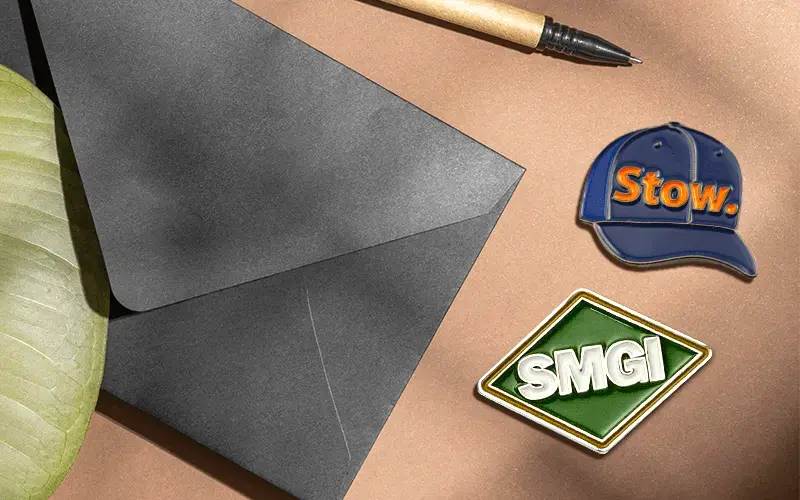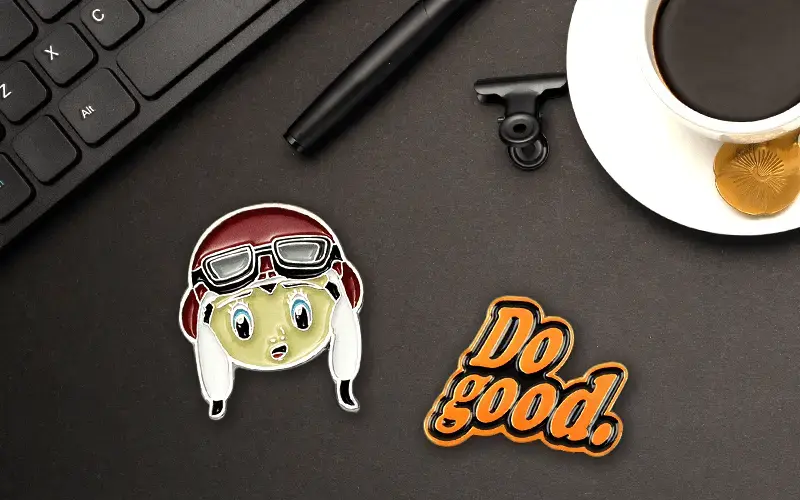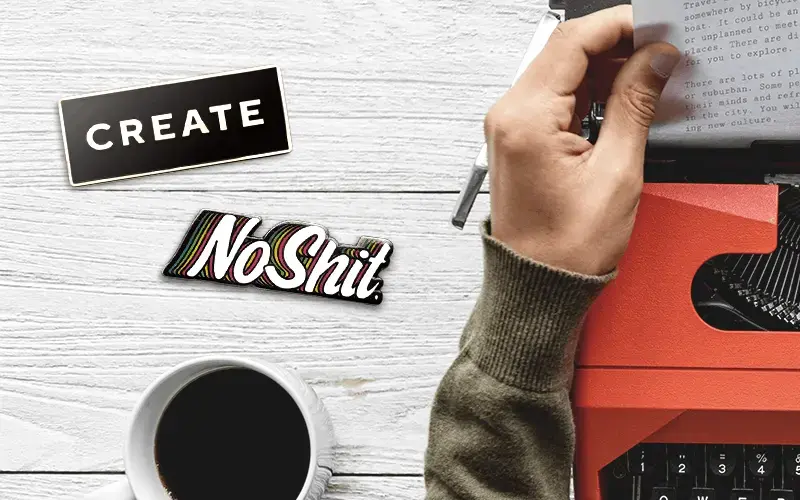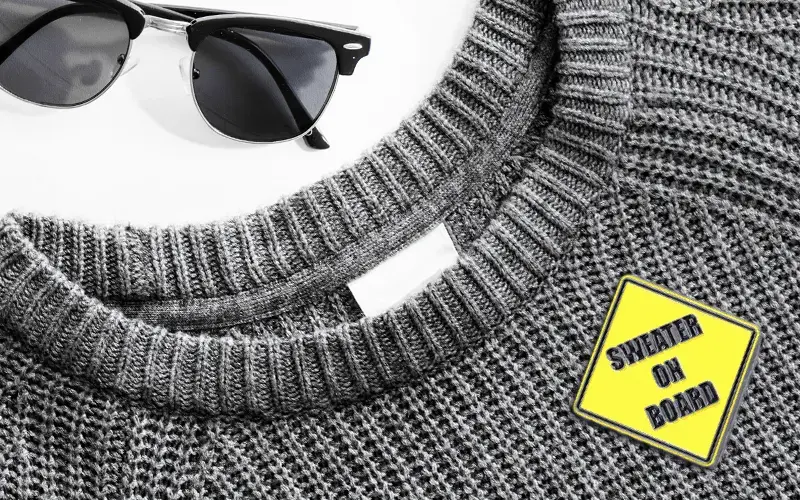Hard Enamel vs Soft Enamel – Which One’s Better for My Design?
So you’re planning on creating enamel pins? Awesome idea! Whether you’re planning on making enamel pins to sell online in your store, hand out at trade shows, or simply promote brand loyalty among your employees and customers, enamel pins are a small yet powerful way to strengthen your business. But the major question is… what kind of enamel pins are you going to make?
Now, we know what you might be thinking – “I’ve already decided to make enamel pins – what decisions are left to make?”
While deciding to create enamel pins does rule out other types of pins such as die-struck pins, offset printed pins, and 3D mold pins, there are still two different types of enamel pins to choose from: hard enamel and soft enamel.
Even with the same exact design and other specs, hard enamel pins and soft enamel pins look very different from each other. They also vary in terms of costs, production processes, and textures. As you design and create your enamel pin, it’s important to have the right pin style in mind.
If you haven’t designed your enamel pin yet, learning more about these two similar yet distinct pin types will help you finalize your pin design with the right look in mind. If you’ve already finished designing your pin, learning more about the key differences between hard enamel pins and soft enamel pins will help you choose the right pin type to bring your vision to life.
Read on to learn about the differences between hard enamel pins and soft enamel pins, how they are similar, and other pin types you may want to consider.
What is an Enamel Pin?

First of all, what is an enamel pin and how is it different from any other pin? An enamel pin is a metal pin or badge with some type of decorative enamel paint on it. The pins themselves may be made of steel, aluminum, copper, brass, iron, or even gold. The enamel can be just about any color or mix of colors you can imagine.
Producing an enamel pin is a somewhat complex process with various stages. The process varies somewhat for hard enamel pins vs. soft enamel pins, but it always involves enamel filling, baking, polishing, and electroplating. Depending on the type of enamel pin you choose, an enamel pin may have a smooth, untextured finish or a textured finish with valleys between each metal line.
Enamel pins can be worn on clothing or other accessories, including t-shirts, jackets, hats, tote bags, backpacks, and more. Their endless customizability and bright color scheme make them a popular option for many different purposes, including:
- Lapel pins, sophisticated pins worn on a suit jacket
- Denim jacket pins, worn on the lapel or pocket of your favorite jacket
- backpack pins, worn alone or as a collection
- Hat pins, pinned on the front of a plain baseball cap
- T-shirt pins, worn to spice up a plain tee
- Logo pins, worn or even sold by a company and its employees
- Political pins, worn to show support for a specific candidate or cause
Enamel pins have become increasingly popular in recent years because of their affordability and customizability. They’re available in a wide variety of styles that can appeal to all ages, interests, and genders.
Kickstart your designs with AI
Leverage the power of AI to streamline your design process,
turning your ideas into polished, production-ready products with ease.
What is a Soft Enamel Pin?

Soft enamel pins are the most traditional type of enamel pins. They are made by pouring soft enamel into a metal mold.
The first stage of manufacturing an enamel pin involves molding the surface of the metal to create a design. Next, the metal is plated, the soft enamel is added, the surface of the metal is polished, and any impurities or excess colors are removed. Finally, the pin is baked and finished with an epoxy coating to protect the paint from cracking or peeling.
Soft enamel pins offer a classic pin look. Since they are made by pouring enamel into the grooves of a metal mold, you’ll notice dips between the metal lines on the pin. Soft enamel pins are bumpy and textured to the touch. They allow for a high level of detail and more contrasting designs.
Soft enamel pins are available in a wide variety of colors. They’re one of the most affordable custom pin options – at THE/STUDIO, they can cost as low as $0.40 each depending on the order quantity and add-ons.
Key Features of Soft Enamel Pins:
- Traditional
- Colorful
- Textured
- Inexpensive
- Easier to make
- Able to accommodate more detail
- Less durable
What is a Hard Enamel Pin?

hard enamel pins may look rather similar to soft enamel pins, but the process to create them is very different.
Also known as cloissoné pins, hard enamel pins are created by adding each piece of colored enamel individually to a die-struck metal mold, heating the entire pin to a high temperature, then polishing and grinding the entire surface of the pin until a flat surface is achieved. hard enamel pins are typically thicker and more durable than soft enamel pins, but they aren’t suitable for extremely intricate designs or certain types of metal.
Hard enamel pins are available in a wide variety of colors. Hard enamel pins typically cost a little more than soft enamel pins, but at THE/STUDIO, they can cost as low as $0.46 each depending on the order quantity and add-ons.
Key Features of Hard Enamel Pins:
- Colorful
- Smooth surface
- More expensive
- More involved production process
- Incapable of supporting fine detail
- More durable and higher quality
What are the key differences between soft enamel and hard enamel?
Soft enamel and hard enamel pins are both made of a mix of enamel and metal, offering a similarly colorful, classic look. But here are the major differences between soft enamel and hard enamel pins:
- Texture. Soft enamel pins have a textured, almost 3D finish, while the surface of a hard enamel pin is very smooth.
- Thickness. Soft enamel pins are typically thinner than hard enamel pins.
- Process. Creating a hard enamel pin is a much more involved process than creating a soft enamel pin. It involves grinding and polishing to achieve the trademark smooth surface.
- Metal options. The grinding and polishing required to create a hard enamel pin make certain metal finishes incompatible.
- Durability. Hard enamel pins are typically more durable and scratch-resistant than soft enamel pins.
- Cost. Hard enamel pins are typically more expensive than soft enamel pins.
Alternatives to enamel pins
If you have your heart set on creating a classic, colorful pin, either a hard enamel pin or a soft enamel pin is a safe bet. However, if you haven’t finalized your design yet or you’re open to creating a different style of pin, you should know that you have other options available to you. THE/STUDIO offers five main types of custom pin styles to choose from. Aside from soft enamel pins and hard enamel pins, you can also decide between die-struck pins, 3D mold pins, or offset printed pins.
Die-struck Pins
Die-struck pins bring custom designs to life with raised and recessed metal. They tend to look a lot like a custom coin, made by stamping a custom design directly onto metal. Die-struck pins occasionally include enamel paint detail for a pop of color, but they traditionally only involve textured metallic designs.
Die-struck pins are monochromatic, understated, and sophisticated, making them an excellent choice for commemorative pins, recognition pins, or award pins. They’re one of the most affordable custom pin options available, priced the same as soft enamel pins.
3D Mold Pins
3D mold pins are perfect for custom designs with really unique shapes. Since they are created by pouring metal into a custom mold, they can be customized to suit any shape or detail. They are also traditionally made with metal only. However, with THE/STUDIO’s wide selection of 14 metals and finishes, they are still very customizable. 3D mold pins are comparable to hard enamel pins in price.
Offset Printed Pins
Offset printed pins are created by printing a design in full color, then protecting it with an epoxy coating. They’re great if you’re seeking to achieve a colorful, photorealistic result with an extremely high level of detail. Offset printed pins are a popular option for novelty pins.
The price of offset printed pins depends on the type of coating the design is protected with. Offset printed pins with a thin epoxy coating are comparable to hard enamel pins in price, while offset printed pins with a thick epoxy dome are the most expensive pins available at THE/STUDIO, costing a small amount more.
Learn more about all of the different pin types available here.
Both hard enamel pins and soft enamel pins are excellent, high-quality pin options. The best choice for you will depend on your pin design. (Haven’t designed your pin yet? Learn how to design a great enamel pin here !)
If your design is more detailed or intricate, a soft enamel pin will likely be your best bet. Soft enamel pins are able to accommodate fine details better than hard enamel pins can.
If your design doesn’t involve very fine detail and you prefer a smooth, untextured finish, a hard enamel pin is best.
Be sure to consider your budget and quality preferences as well. Soft enamel pins typically cost a bit less than hard enamel pins, but hard enamel pins are more durable, scratch-resistant, and all-around high quality.
To a certain extent, this decision is all just a matter of preference! Check out a few pictures of hard and soft enamel pins and decide which style you (and most importantly, your customers!) prefer. Honestly, you can’t go wrong either way!
How to Create a Hard Enamel or Soft Enamel Pin

As we’ve discussed, the production process varies significantly whether you’re creating a hard enamel pin or a soft enamel pin. But as far as you’re concerned, the custom product creation process is extremely similar no matter what type of pin you decide to make! THE/STUDIO’s DIY online product creation tool makes it easy to partner with top factories in producing a high-quality hard enamel or soft enamel pin. We’ll walk you through the simple process step-by-step:
1. Select your pin type
Now that you know all of the ins and outs of the differences between hard enamel and soft enamel pins, it’s time to commit to one! To kickstart the product creation process, choose between custom hard enamel pins, custom soft enamel pins, custom 3D mold pins, custom die-struck pins, or custom offset printed pins.
2. Customize your enamel pin
Now, it’s time to start making your hard or soft enamel pin your own. You’ll have the chance to customize the metal color and finish of your pin, what sort of backing attachment your pin has, how many enamel colors your pin design will include, retail-ready backing cards, and other add-ons.
3. Submit your pin design
Next, it’s time to finalize your pin design. If you’ve already worked out all of the design details, great – simply submit a PDF of your design and our team will work their magic! If design really isn’t your thing, that’s okay, too – our in-house design team can take your direction and create a beautiful design for you, free of charge.
4. Approve a prototype of your pin
Next up, we’ll get to work on creating a prototype for your approval. You’ll either receive a mockup in the mail or receive a detailed set of photos to review. If all looks great, we’ll move forward with production. If you see any changes that need to be made, just respond with detailed feedback and we’ll tweak things until we get at right (at no additional charge, of course!).
5. Receive your custom pins
Hooray! Now that your pin is totally finalized, all that’s left for you to do is wait for your enamel pin order to come in the mail. You’ll enjoy free U.S. shipping and a 100% satisfaction guarantee on your order.
Ready to start creating your very own custom hard enamel or soft enamel pins? Start the process here!




